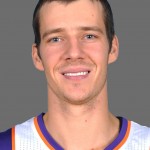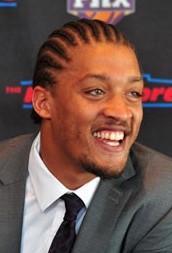“From our standpoint,” Gentry said, “were just trying to take a group of guys and some returners … and make them a cohesive unit.”
A cynic would say good luck with that. An optimist like Gentry would point out that Michael Beasley was the second player taken in the 2008 draft and Wesley Johnson was the fourth player taken in 2010.
“We have to try to get those guys to that level of where they were drafted,” Gentry said. “They’ve had their moments, but consistency was kind of the problem they run into.”
It’s been that way for a number of new players on the roster. Johnson is 25 and already is with his second team in three years. Beasley is 23 and with his third team in four years. Shannon Brown is 27 and with his fifth team in six years. Sebastian Telfair is 27 and with his seventh team in eight years.
All have talent, but all the teams they have been with have tried to extract that talent without a lot of success.
Good luck with that.
“We’re preaching that you have a chance to redeem yourself and rectify anything that may have been a negative in the past,” Gentry said. “I told them the legacy we had started form the first day of training camp moving forward. We’re not looking back and we’re not (concerned about) where they were last year or what they did. You get to come in here with a clean slate and move forward from there.”
The Suns are not without skilled players. Luis Scola, who is likely to lead the team in scoring, was signed after he was amnestied by the Rockets.
Goran Dragic, who played two-plus years in Phoenix before a trade to Houston, signed as a free agent with the Suns and while not being confused with Nash can be a competitive point guard in the league.
And in Marcin Gortat, who had 16 points and 16 rebounds in a victory over Detroit to open the season, the Suns have a top-level center.
But they don’t have Steve Nash, who was granted his request of being traded to the Lakers when his contract expired after last season.
The senior Sun in terms of service is guard Jared Dudley, who arrived in Phoenix from Charlotte in December 2008.
“It’s a little weird,” Dudley said of Nash’s absence. “I’m kind of the last person here from the Western Conference finals team, but it’s a good opportunity for me to show my leadership skills and how I’ve improved and take the next step in my career.”
Dudley, however, is a realist.
“It’s definitely going to take time,” he said. “Transition would be the best word to use for that. It’s something that it is fitting that Goran is taking over for Steve. He was drafted for this. He went to Houston, got to start so it’s perfect for him to do it.
“And Scola is going to help because you can put him on the wing and he’s a good passer. He’s going to help with the transition. We’ve got some talent here; we’ve just got to buy into it.”
NBA players have a long history of grand dreams after the departure of a franchise player. I once interviewed Houston guard Calvin Murphy after league MVP Moses Malone left for Philadelphia in 1982, and he said the Rockets – who had been in the Finals with Malone in 1981 – would not miss a step.
“We’re still men,” the feisty Murphy said. “We’re NBA players. We’re not going to lay down. Our goal is to win.”
The Rockets did win – exactly 14 games. They lost 68.
The Suns are talking bravely about making the playoffs, and if they do, that will be a great story. But great stories are not about illusions. They are almost always the product of star power. And without Nash, the Suns are going to discover the same thing discovered by George, Elaine and Kramer.
If you’ve got no Jerry, you’ve got no Seinfeld.
Jan Hubbard has written about basketball since 1976 and worked in the NBA league office for eight years between media stints. Follow him on Twitter at @whyhub. For Hubbard’s archive from SheridanHoops.com, click here.
